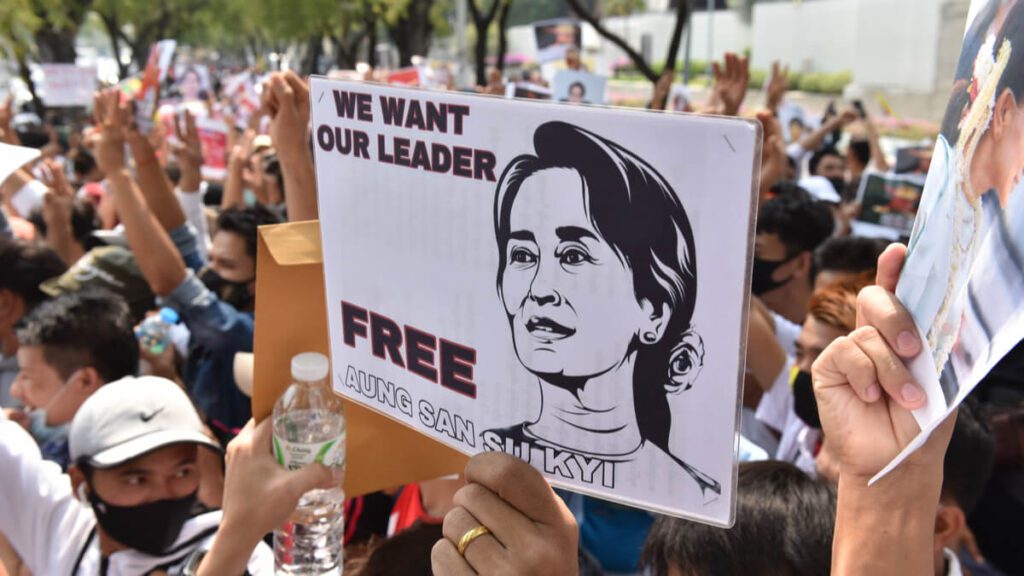
Norwegian telecom operator Telenor is facing increased pressure on multiple fronts in Myanmar, as it stands toe-to-toe with the country’s junta over its employees’ safety, while confronted with a draconian cybersecurity bill.
Following its military coup on February 1, the junta has repeatedly forced Internet services providers to shut down or restrict access to the Internet since seizing power and imprisoning local leaders; Telenor had attempted to provide transparency by publishing any ordered outages on its website.
However, the telco said on Sunday that “it is currently not possible for Telenor to disclose the directives we receive from the authorities” in Myanmar, adding that “we deeply regret that the list on this site will no longer be updated.”
“Our overall judgement of the situation now means that we can’t communicate about the directives,” spokeswoman Hanne Langeland Knudsen told the AFP, saying that the situation in Myanmar is “confused and unclear” and that “our employees’ security has had top priority from the start.”
The majority state-owned Norwegian operator has been in the Myanmar market since 2014 and employs almost 747 people within the country.
The junta forced a fourth nationwide Internet shutdown last night, according to UK-based monitoring group NetBlocks, but was reopened this morning.
The military has forced numerous Internet outages across Myanmar since the coup, in an attempt prevent thousands of protesters in the streets from communicating and coordinating, as extra boots on the ground have been deployed to intensify the crackdown.
In parallel, Telenor is also facing a censorship and control-oriented cybersecurity bill introduced by the junta that would grant them sweeping powers over digital content. The operator was swift to slam the bill, with its chief exec, Sigve Brekke, telling the Financial Times that it was too broad, failed to consider human rights, and should not be implemented as written.
“We are very, very clear in our response. How that’s going to be received, I don’t know… It is a very uncertain and irregular situation,” Brekke added.
Many have described the bill as draconian, with Human Rights Watch highlighting that it would give the junta “almost unlimited power to access user data, putting anyone who speaks out at risk.”
On the early morning hours of February 1, the military overthrew the democratically elected government, arresting senior officials such as Aung San Suu Kyi after less than a decade of civilian rule. Telenor had faced previous pressure when military officials ordered it to block access to various social media platforms such as Facebook, Instagram, and Twitter.
Facebook is considered the most popular in Myanmar with 21 million active users, as Brekke noted that the proposed law would “silence peaceful political speech” and called for the “immediate retraction of this law.”
A statement issued by the provider highlighted that the proposed Bill should be properly consulted with a broad range of affected stakeholders (allowing public debate) and debated in Parliament to ensure that the law is fit for purpose and in line with the Constitution of Myanmar.
“We are concerned that the proposed Bill does not progress relevant regulatory frameworks and law for a digital future, nor promotes and safeguards digital safety and rights,” it added.
The statement argued that the country has international obligations in relation to international agreements, treaties, and international human rights law. “These obligations include respect for rule of law and good governance, and respect for the protection of human rights and fundamental freedoms,” it stressed.
To this end, Telenor Group outlined four key principles in relation to the proposed Bill, as its strongly objects to the passing of the law without addressing the following concerns:
- Human rights considerations: The proposed Bill must give due consideration to fundamental human rights such as freedom of speech and expression in Myanmar and personal privacy and security concerns to people in Myanmar.
- Applicability of the proposed Bill: Passing the proposed Bill during a state of emergency and granting such broad powers to a temporary administration is not appropriate.
- Execution of powers: There must be transparency, legal certainty, due process, and clear criteria for the exercise of powers and interventions, independent administration, and independent oversight under the proposed Bill.
- Scope of proposed Bill: The proposed Bill should not include powers which can be used to order Lawful Interception, which is covered by the Telecom Law. Further, laws governing personal data protection, electronic transactions and cyber security should be kept separate to allow for more comprehensive protection, governance, and execution across all areas.
“The military rulers are implementing new type of rules and regulations and now we are not able to be open about everything that happens. That is a big concern for us,” Brekke concluded.